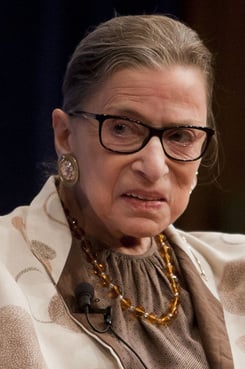Unanimous US Supreme Court Bars 'Stacked' Class Actions
“We hold that American Pipe does not permit a plaintiff who waits out the statute of limitations to piggyback on an earlier, timely filed class action,” Ginsburg wrote for the court Monday in "China Agritech v. Resh." The U.S. Chamber of Commerce, the Washington Legal Foundation and others supported China Agritech in amicus briefs.
June 11, 2018 at 02:54 PM
5 minute read

Class action defendants scored an important victory Monday when a unanimous U.S. Supreme Court barred so-called stacked, or follow-on, cases that are filed after the expiration of a statutory time limit.
The justices, ruling in a securities case, said its 1974 decision in American Pipe & Construction v. Utah suspends the statute of limitations while a putative class action is pending, which allows unnamed class members to join individually or to file separate claims if the class fails. “But American Pipe does not permit the maintenance of a follow-on class action past expiration of the statute of limitations,” wrote Justice Ruth Bader Ginsburg for the court in China Agritech v. Resh.
 Ruth Bader Ginsburg
Ruth Bader GinsburgBoth the Private Securities Litigation Reform Act, which governed the litigation before the court, and Federal Rule of Civil Procedure 23, which applies to nonsecurities class actions, “evince a preference” for barring untimely successive class actions by emphasizing early resolution of class certification and class representation, Ginsburg wrote.
The case before the court, the third class action brought on behalf of purchasers of China Agritech's common stock, alleged violations of the Securities Exchange Act of 1934. The law has a two-year statute of limitations that begins to run when facts constituting the violation are discovered.
A federal district court had denied class certification to two earlier successive class actions that made materially identical allegations against China Agritech for fraud and misleading business practices. Michael Resh, who had not sought lead plaintiff status in those earlier class actions, filed suit in 2014, a year and a half after the statute of limitations had expired.
The U.S. Court of Appeals for the Ninth Circuit in May 2017 reversed the district court's dismissal of Resh's suit as untimely. The circuit courts had divided over whether American Pipe could, as the Ninth Circuit concluded, save otherwise untimely successive class claims.
Ginsburg said nothing in America Pipe or the court's decisions applying it “so much as hints” that tolling extends to otherwise time-barred claims.
“We hold that American Pipe does not permit a plaintiff who waits out the statute of limitations to piggyback on an earlier, timely filed class action,” Ginsburg wrote. “The 'efficiency and economy of litigation' that support tolling of individual claims do not support maintenance of untimely successive class actions; any additional class filings should be made early on, soon after the commencement of the first action seeking class certification.”
Locke Lord partner Rusty Perdew in Chicago said the decision takes a “practical and realistic approach” and gives class defendants an important victory. The Ninth Circuit's decision, he said, “would have permitted plaintiffs to indefinitely extend statutes of limitations and relitigate class certification by filing successive class actions after class certification was denied.”
However, Noelle Reed, a partner at Skadden, Arps, Slate, Meagher & Flom, cautioned that the decision, along with the court's 2017 decision in California Public Employees' Retirement System v. ANZ Securities, “may spur plaintiffs to file multiple 'protective' class actions—possibly in competing courts—to avoid having their class claims time-barred if they are not able to obtain class certification before limitations or repose periods expire.”
Justice Sonia Sotomayor concurred in the court's judgment, explaining that she agreed with the court's decision as it applied to class actions under the Private Securities Litigation Reform Act of 1995, but not as to class actions not subject to that act.
Sotomayor said there are important differences between classes governed by the 1995 act and classes subject to Rule 23.
“The majority's conclusion that absent class members were not diligent because they failed to ask to be the class representative in a prior suit makes sense only in the PSLRA context,” she wrote. “The same conclusion simply does not follow in the generic Rule 23 context, where absent class members are most likely unaware of the existence of a putative class action.”
China Agritech's counsel, Seth Aronson, partner at O'Melveny & Myers, had argued that the Ninth Circuit's rule “impermissibly extends equitable tolling when the plaintiffs have not exercised diligence.” Those absent class members, he said, could have sought to protect their rights through individual actions when the class failed. Instead, they “slept on their rights and are thus not entitled to equity.”
Resh's counsel, David Frederick of Kellogg, Hansen, Todd, Figel & Frederick, had countered that a timely class action suspends the limitations as to all asserted class members and “puts defendants on fair notice of potential liability in a subsequent class action asserting similar claims.”
The U.S. Chamber of Commerce, the Washington Legal Foundation and others supported China Agritech in amicus briefs. Resh drew supporting briefs from a group of plaintiffs in post-Walmart successor class actions, Public Citizen, AARP and a group of retired federal judges, among others.
This content has been archived. It is available through our partners, LexisNexis® and Bloomberg Law.
To view this content, please continue to their sites.
Not a Lexis Subscriber?
Subscribe Now
Not a Bloomberg Law Subscriber?
Subscribe Now
NOT FOR REPRINT
© 2025 ALM Global, LLC, All Rights Reserved. Request academic re-use from www.copyright.com. All other uses, submit a request to [email protected]. For more information visit Asset & Logo Licensing.
You Might Like
View All
Crypto Exchange’s ‘Meteoric Rise’ Leads to Nationwide Class Action Trend
4 minute read
'The Tobacco Industry of This Decade': Slew of Class Actions Accuse DraftKings of Creating Addicts
5 minute read
Pentagon Settles Suit Seeking to Clear Records of Service Members Discharged for Being LGBTQ
3 minute readTrending Stories
Who Got The Work
J. Brugh Lower of Gibbons has entered an appearance for industrial equipment supplier Devco Corporation in a pending trademark infringement lawsuit. The suit, accusing the defendant of selling knock-off Graco products, was filed Dec. 18 in New Jersey District Court by Rivkin Radler on behalf of Graco Inc. and Graco Minnesota. The case, assigned to U.S. District Judge Zahid N. Quraishi, is 3:24-cv-11294, Graco Inc. et al v. Devco Corporation.
Who Got The Work
Rebecca Maller-Stein and Kent A. Yalowitz of Arnold & Porter Kaye Scholer have entered their appearances for Hanaco Venture Capital and its executives, Lior Prosor and David Frankel, in a pending securities lawsuit. The action, filed on Dec. 24 in New York Southern District Court by Zell, Aron & Co. on behalf of Goldeneye Advisors, accuses the defendants of negligently and fraudulently managing the plaintiff's $1 million investment. The case, assigned to U.S. District Judge Vernon S. Broderick, is 1:24-cv-09918, Goldeneye Advisors, LLC v. Hanaco Venture Capital, Ltd. et al.
Who Got The Work
Attorneys from A&O Shearman has stepped in as defense counsel for Toronto-Dominion Bank and other defendants in a pending securities class action. The suit, filed Dec. 11 in New York Southern District Court by Bleichmar Fonti & Auld, accuses the defendants of concealing the bank's 'pervasive' deficiencies in regards to its compliance with the Bank Secrecy Act and the quality of its anti-money laundering controls. The case, assigned to U.S. District Judge Arun Subramanian, is 1:24-cv-09445, Gonzalez v. The Toronto-Dominion Bank et al.
Who Got The Work
Crown Castle International, a Pennsylvania company providing shared communications infrastructure, has turned to Luke D. Wolf of Gordon Rees Scully Mansukhani to fend off a pending breach-of-contract lawsuit. The court action, filed Nov. 25 in Michigan Eastern District Court by Hooper Hathaway PC on behalf of The Town Residences LLC, accuses Crown Castle of failing to transfer approximately $30,000 in utility payments from T-Mobile in breach of a roof-top lease and assignment agreement. The case, assigned to U.S. District Judge Susan K. Declercq, is 2:24-cv-13131, The Town Residences LLC v. T-Mobile US, Inc. et al.
Who Got The Work
Wilfred P. Coronato and Daniel M. Schwartz of McCarter & English have stepped in as defense counsel to Electrolux Home Products Inc. in a pending product liability lawsuit. The court action, filed Nov. 26 in New York Eastern District Court by Poulos Lopiccolo PC and Nagel Rice LLP on behalf of David Stern, alleges that the defendant's refrigerators’ drawers and shelving repeatedly break and fall apart within months after purchase. The case, assigned to U.S. District Judge Joan M. Azrack, is 2:24-cv-08204, Stern v. Electrolux Home Products, Inc.
Featured Firms
Law Offices of Gary Martin Hays & Associates, P.C.
(470) 294-1674
Law Offices of Mark E. Salomone
(857) 444-6468
Smith & Hassler
(713) 739-1250











